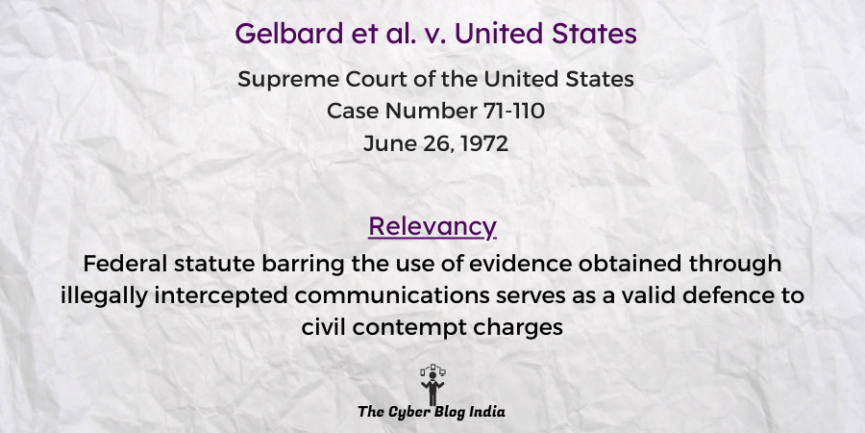Gelbard et al. v. United States

Gelbard et al. v. United States
408 U.S. 41 (1972)
In the Supreme Court of the United States
Case Number 71-110
Before Chief Justice Burger, Justice Douglas, Justice Brennan, Justice Stewart, Justice White, Justice Marshall, Justice Blackmun, Justice Powell, and Justice Rehnquist
Decided on June 26, 1972
Relevancy of the Case: Federal statute barring the use of evidence obtained through illegally intercepted communications serves as a valid defence to civil contempt charges.
Statutes and Provisions Involved
- The Omnibus Crime Control and Safe Streets Act, 18 U.S.C. §§ 2510-2520
- Litigation Concerning Sources of Evidence, 18 U.S.C. §3504
Relevant Facts of the Case
- The federal agents tapped the telephones of two individuals, namely Paul and Zarowitz. Paul is an alleged bookmaker, while Zarowitz is a former Las Vegas casino executive.
- The agents recorded the conversations between Paul and Gelbard and between Zarowitz and Sidney.
- The government pressed Gelbard and Sidney to testify about these conversations before a federal grand jury. However, they refused to do so. They claimed that the wiretaps were illegal and argued that they should have an opportunity to challenge the legality of the taps before the court required them to testify.
- The District Court for California’s Southern District found them in contempt of court and committed them to custody until they agreed to testify.
- The Court of Appeals for the Ninth Circuit agreed with the District Court’s decision. The court stated that a witness in a grand jury proceeding has no right to resort to a court to secure authoritative advance determination concerning evidentiary matters.
- The appellants have appealed before the Supreme Court, citing a Third Circuit judgment vacating charges in similar circumstances.
Prominent Arguments by the Counsels
- The witnesses’ counsel submitted that Title III’s evidentiary prohibition afforded them a defence to the contempt charges.
- The Deputy Solicitor General contended that the government can compel the testimony of the witnesses. Procedures in Section 3504 are limited in application to claims of inadmissibility based on illegal interceptions. Furthermore, he argued that Section 2515 could be construed to allow a grand jury witness to invoke its prohibition as a defence to a contempt charge if this was the only relevant portion of Title III.
Opinion of the Bench
- Justice Brennan wrote the majority opinion of the bench for himself, Justice Douglas, Justice Stewart, Justice White, and Justice Marshall. Chief Justice Burger, Justice Blackmun, Justice Powell, and Justice Rehnquist dissented from the majority opinion.
- Justice Brennan: A federal statute barring the use of evidence obtained through illegally intercepted communications serves as a valid defence to civil contempt charges. Section 2515 is an available defence that finds additional support in Section 3504. Section 3504 explicitly confirms that Congress intended that grand jury witnesses might refuse to answer questions based on the illegal interception of their communications.
- Justice Douglas: The Fourth Amendment’s prohibition against illegal searches and seizures provides enough protection. These protections can suppress illegally obtained communications even without the federal wiretapping statute. If a court assists the Government in extracting fruits from the victims of its lawless searches, it degrades the integrity of the judicial system.
- Justice White: Courts should look for a way other than suppression hearings to resolve such conflicts. Such hearings directly interrupt the flow of grand jury hearings.
- Justice Rehnquist: The statute’s clear language and legislative history prohibited its use as a defence to civil contempt charges arising from grand jury proceedings.
Final Decision
- By a 5-4 majority, the court reversed the Ninth Circuit’s judgment. Further, the court remanded the case to be heard in line with this decision.
